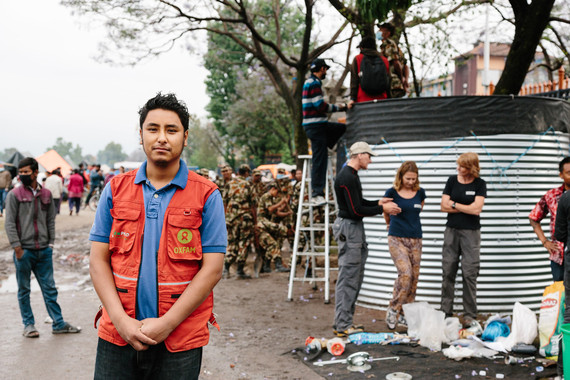Today, World Humanitarian Day, commemorates the twenty-two aid workers killed in a bombing at the UN headquarters in Baghdad in 2003 and is dedicated to those who risk their lives every day to provide humanitarian aid to people around the world. This year, it is about creating a greater sense of responsibility within our global community to support each other in times of crisis and give recognition to humanitarians who don't ask for it. Now more than ever, there are many unsung heroes.
On World Humanitarian Day, we thank these heroic women and men who are performing critical life-saving work, and challenge ourselves to have a larger conversation about how we can better support them as they carry out their work.
These individuals are the integral core of the international humanitarian system, but as it becomes increasingly overstretched and underfunded, they are being forced to meet an ever-growing need with scarce resources. The UN Secretary General Ban Ki-moon recently emphasized that responding to ten major crises at once, as it is now, is unprecedented in the 70-year history of the United Nations.
Oxfam believes that in order to help humanitarians do their jobs more effectively, we must change the system. When the UN or organizations like Oxfam respond to a major crisis, international staff fly in to support, but the real brunt of the work and risk is undertaken by local people who live in the affected communities - and very rarely are they the ones written about or thanked on the international stage. They are often the true heroes. Their role makes sense, as local partners know where aid is most needed and understand local contexts and languages in order to deliver assistance more effectively. But, it is neither equitable nor pragmatic to expect them to do so without being given the funding or opportunity to lead this work.
For example, when a massive earthquake hit Nepal earlier this year, it was local people who were already on the ground helping their family, friends and neighbors even before international aid quickly arrived. Shekhar Khadka, 23, (pictured above) is one of 500 volunteers trained to react in the event of an earthquake. He rushed to help in the early days of the response, working to erect water tanks to provide clean drinking water at the Tundikhel IDP camp in Kathmandu. At the time he said, "I'm sleeping under canvass outside our house but my family are safe. I became a volunteer because I wanted to serve my community." While Oxfam plans to continue our life-saving work in Nepal for the long-term, it is Nepali communities and organizations that have the skills and incentive to hold their government accountable and work with them to rebuild their country and be ready for another crisis in the future. Oxfam wants to ensure that local humanitarian workers, like Shekhar, are able to prepare for disasters and have the power to make decisions and lead the response if another disaster should occur.
It won't be easy, but there are opportunities to push the system in the right direction. The World Humanitarian Summit in 2016 is a key one as it will shape the future direction of the global humanitarian system.
We also have two chances this fall to reach decision-makers and help guide these conversations to support humanitarians working in the overstretched humanitarian system: The October Global Consultation of UN member states, including the United States, and the November report of the UN High Level Panel on Humanitarian Financing. These meetings will shape the ambitions and agenda of the World Humanitarian Summit. Participants will work to identify ways to close the yawning gap between need and resources and how we might strengthen the humanitarian system. We urge them to emphasize the need to build local capacity, the importance of more humanitarian funding being granted directly to local actors, and more predictable humanitarian funding for crises, so the entire system can be confident money will arrive in time for an effective response.
It is critically important to take the time to pause and share the many stories of dedication, sacrifice and selflessness that humanitarian workers display every day. They have saved countless lives, while in too many cases, sacrificing their own. But, we owe these unsung heroes more than gratitude - they need support to conduct their life-saving work every day of the year.
